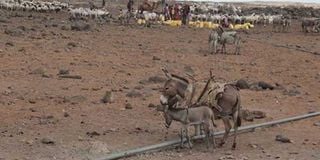Marsabit stares at starvation after a year with no rain

Residents of Segel in Marsabit County flock a community well to water their animals and fetch water on April 21, 2019. After more than a year without rainfall, the residents of Marsabit are now staring at starvation. PHOTO | JOSEPH KANYI | NATION MEDIA GROUP
What you need to know:
- The drought that has ravaged parts of the country has left them frail and vulnerable.
- The residents have now appealed for government intervention.
- Livestock carcasses are scattered across the dry fields.
After more than a year without rainfall, residents of Marsabit County are staring at starvation.
The drought that has ravaged parts of the country has left them frail and vulnerable.
Livestock carcasses are scattered across the dry fields, with women carrying empty containers, walking for long distances in search of water.
The residents have now appealed for government intervention.
“The way the weather looks now, we do not see any chance of receiving any rain this season. Maybe in the next five months during the short rains,” Mr Isako Salesa, of Segel village, told the Nation.
BOREHOLES
Like most villages, Segel now depends on two boreholes, which might not see them through the next six months.
The boreholes are the only source of water for the 33 households and more than 5,000 livestock.
The generator-operated boreholes are costly to operate, but the locals have no choice but to keep them running.
Although they were sunk by the county government, locals have to spend more than Sh230,000 every month to keep the water flowing.
JOBLESS
This means that the largely jobless population of Segel has to make huge financial sacrifices just to get water.
Mr Abdi Shalu is tasked with ensuring that the generator keeps pumping water to two troughs that supply the residents.
“It is very expensive to run because we have to buy 200 litres of diesel every three days. That is Sh23,000 for every three days. The users have to raise the money,” Mr Shalu said.
The residents have to pay Sh10 for each goat to drink and Sh50 a month per camel.
Their animals are their only source of income, which means they have to sell them to get money to keep the water flowing.
But the situation has become worse in recent months since the prices of animals have fallen drastically because of their poor condition as a result of lack of pasture and water.





